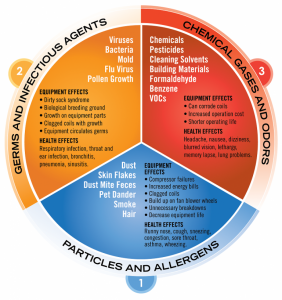 207-885-0771
207-885-0771During the colder months, we all feel trapped inside. The really scary thing is what you’re trapped with! You are stuck inside with all sorts of virus germs, hazardous humidity, and dangerous toxins. The winter season contributes significantly to poor air quality. There are a number of elements that contribute to indoor air quality (IAQ), and air quality is really challenged during dry, cold months. Poor indoor air quality can affect your health and safety, so it’s not something to ignore.
When everything is closed up to keep heat in, contaminants are not able to escape your home. They are able to accumulate and multiply at a fast pace in warm inside air. These can include dust mites, mold spores, and sicknesses such as viruses and bacteria. Any of these contaminants can cause you to get sick. If you already have an underlying health issues like a respiratory illness, or if your immune system is not strong, your home can become a real danger to your health.
Changing seasons have a big effect on air quality, indoors and out. When the temperature drops in winter, it changes the way air moves. Cold weather causes warm air to rise which traps cold air—and all the pollutants in it – in the air we are breathing.
Cold weather also causes people’s behavior patterns to impact air quality. We’re heating up our cars in garages or right outside windows. We are using gas or wood-burning fireplaces. These habits all release smoke, fumes, and vehicle exhaust into the air. These poisons can easily make their way into your home through open doors and drafty windows, and even on pet fur or clothing.

We even pollute our indoor air without intending to. The more time we spend at home indoors, the more frequently we’re cooking, cleaning, and using products that affect the air we breathe. Cooking, especially with oil on the stovetop, can release dangerous exhaust into the air. Most cleaning products give off harmful fumes. The steam produced from running hot water in the kitchen or shower can increase mold spores in the air. Even day-to-day activities that seem harmless – like burning your favorite candle or brushing your pet – can release unwanted contaminants into the air.
Even though it seems like there are so many pollutants in the air when you’re spending more time inside at home, there are things you can do to reduce the amount of harmful contaminants in your air.
Be sure to choose HVAC filters that capture the particles that concern you. HEPA (high efficiency particulate air) filters are designed to get rid of airborne particles including pet dander, pollen, dust, microorganisms, and other particles in a room. HEPA filters are effective at getting rid of particles that are as small as 0.3 microns in size. You can find HEPA filters in a broad range of capacities and sizes.
Speaking of filters – be sure you clean or replace filters in all the equipment that air passes through in your home regularly. Furnace filters should be changed monthly. Many HEPA filters can be cleaned, but follow the manufacturers recommendations.
Keeping your home clean through regular dusting and washing surfaces is important to air quality throughout the winter months. Regularly inspect areas for mildew and mold growth and attend to it immediately.
We think that the tighter the home, the better the energy efficiency. But unfortunately, super tight homes also trap more polluted air. Increasing ventilation (the air flow in your home) cam improve indoor air quality. Use ceiling fans, and be sure to run exhaust fans in the kitchen and bathroom. Even a slightly opening a window can help to let some fresh air into the house.
Poor indoor air quality is nothing to mess around with. Even otherwise healthy individual can become very sick from prolonged exposure to various contaminants and toxins. Be sure you have your HVAC system professionally inspected each year to ensure it is functioning properly.
Your HVAC system is there to maintain a comfortable temperature in your home throughout the year. Make it even more valuable with indoor air quality equipment add-ons that can capture allergens, kill germs, and purify your indoor air quality!
Gelinas HVAC offers the highest quality line of indoor air quality products that will keep your indoor air free from allergens, harmful particles, germs, and dangerous fumes.
We also offer annual HVAC system inspections and cleanings.